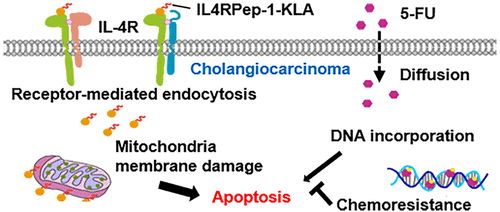当前位置:
X-MOL 学术
›
Mol. Pharmaceutics
›
论文详情
Our official English website, www.x-mol.net, welcomes your feedback! (Note: you will need to create a separate account there.)
Inhibition of Tumor Growth against Chemoresistant Cholangiocarcinoma by a Pro-apoptotic Peptide Targeting Interleukin-4 Receptor.
Molecular Pharmaceutics ( IF 4.9 ) Pub Date : 2020-09-03 , DOI: 10.1021/acs.molpharmaceut.0c00529 Uttapol Permpoon 1, 2, 3, 4 , Fatima Khan 1, 2, 3 , Sri Murugan Poonkavithai Vadevoo 1, 2, 3 , Smriti Gurung 1, 2, 3 , Gowri Rangaswamy Gunassekaran 1, 2 , Min-Jong Kim 2, 3, 5 , Sang-Hyun Kim 2, 3, 5 , Peti Thuwajit 4 , Byungheon Lee 1, 2, 3
Molecular Pharmaceutics ( IF 4.9 ) Pub Date : 2020-09-03 , DOI: 10.1021/acs.molpharmaceut.0c00529 Uttapol Permpoon 1, 2, 3, 4 , Fatima Khan 1, 2, 3 , Sri Murugan Poonkavithai Vadevoo 1, 2, 3 , Smriti Gurung 1, 2, 3 , Gowri Rangaswamy Gunassekaran 1, 2 , Min-Jong Kim 2, 3, 5 , Sang-Hyun Kim 2, 3, 5 , Peti Thuwajit 4 , Byungheon Lee 1, 2, 3
Affiliation

|
Cholangiocarcinoma (CCA) has a poor prognosis and high chemoresistance. Interleukin-4 receptor (IL-4R) is overexpressed in several cancer cells and plays a crucial role in tumor progression and drug resistance. IL4RPep-1, an IL-4R-binding peptide, has been identified by phage display and used for tumor targeting. In this study, we exploited IL4RPep-1 to guide the tumor-specific delivery of a proapoptotic peptide to chemoresistant CCA, thereby inhibiting tumor growth. Immunohistochemistry of human primary CCA tissues showed that IL-4R levels were upregulated in moderately to poorly differentiated types, and higher levels of IL-4R are correlated with lower survival rates in patients with CCA. IL4RPep-1 was observed to preferentially bind with high IL-4R-expressing KKU-213 human CCA cells, whereas it barely bound with low IL-4R-expressing KKU-055 cells. A hybrid of IL4RPep-1 and a proapoptotic peptide (KLAKLAK)2 (named as IL4RPep-1–KLA) induced cytotoxicity and apoptosis in KKU-213 cells and increased those levels induced by 5-fluorouracil (5-FU). IL4RPep-1–KLA was internalized in the cells and colocalized with mitochondria. Whole-body fluorescence imaging and immunohistochemical analysis of tumor tissues showed the homing of IL4RPep-1–KLA as well as IL4RPep-1 to KKU-213 tumor in mice. Systemic administration of IL4RPep-1–KLA efficiently inhibited KKU-213 tumor growth, whereas treatment with 5-FU alone did not significantly inhibit tumor growth in mice. No significant systemic side effects including liver toxicity and immunotoxicity were observed in mice during peptide treatments. These findings suggest that IL4RPep-1–KLA holds potential as a targeted therapeutic agent against chemoresistant CCA.
中文翻译:

通过靶向白细胞介素 4 受体的促凋亡肽抑制耐化学性胆管癌的肿瘤生长。
胆管癌(CCA)预后差,耐药性高。白细胞介素 4 受体 (IL-4R) 在几种癌细胞中过度表达,并在肿瘤进展和耐药性中起关键作用。IL4RPep-1 是一种 IL-4R 结合肽,已通过噬菌体展示鉴定并用于肿瘤靶向。在这项研究中,我们利用 IL4RPep-1 来指导肿瘤特异性递送促凋亡肽到化学抗性 CCA,从而抑制肿瘤生长。人类原发性 CCA 组织的免疫组织化学表明,IL-4R 水平在中度至低分化类型中上调,并且 IL-4R 水平较高与 CCA 患者的较低存活率相关。观察到 IL4RPep-1 优先与高表达 IL-4R 的 KKU-213 人 CCA 细胞结合,而它几乎不与低表达 IL-4R 的 KKU-055 细胞结合。IL4RPep-1 和促凋亡肽 (KLAKLAK)2(命名为 IL4RPep-1–KLA)的杂交体在 KKU-213 细胞中诱导细胞毒性和凋亡,并增加了由 5-氟尿嘧啶 (5-FU) 诱导的那些水平。IL4RPep-1-KLA 在细胞中内化并与线粒体共定位。肿瘤组织的全身荧光成像和免疫组织化学分析显示 IL4RPep-1-KLA 以及 IL4RPep-1 归巢到小鼠的 KKU-213 肿瘤。全身给药 IL4RPep-1-KLA 有效抑制 KKU-213 肿瘤生长,而单独使用 5-FU 治疗并不能显着抑制小鼠的肿瘤生长。在肽治疗期间,在小鼠中未观察到显着的全身性副作用,包括肝毒性和免疫毒性。
更新日期:2020-11-02
中文翻译:

通过靶向白细胞介素 4 受体的促凋亡肽抑制耐化学性胆管癌的肿瘤生长。
胆管癌(CCA)预后差,耐药性高。白细胞介素 4 受体 (IL-4R) 在几种癌细胞中过度表达,并在肿瘤进展和耐药性中起关键作用。IL4RPep-1 是一种 IL-4R 结合肽,已通过噬菌体展示鉴定并用于肿瘤靶向。在这项研究中,我们利用 IL4RPep-1 来指导肿瘤特异性递送促凋亡肽到化学抗性 CCA,从而抑制肿瘤生长。人类原发性 CCA 组织的免疫组织化学表明,IL-4R 水平在中度至低分化类型中上调,并且 IL-4R 水平较高与 CCA 患者的较低存活率相关。观察到 IL4RPep-1 优先与高表达 IL-4R 的 KKU-213 人 CCA 细胞结合,而它几乎不与低表达 IL-4R 的 KKU-055 细胞结合。IL4RPep-1 和促凋亡肽 (KLAKLAK)2(命名为 IL4RPep-1–KLA)的杂交体在 KKU-213 细胞中诱导细胞毒性和凋亡,并增加了由 5-氟尿嘧啶 (5-FU) 诱导的那些水平。IL4RPep-1-KLA 在细胞中内化并与线粒体共定位。肿瘤组织的全身荧光成像和免疫组织化学分析显示 IL4RPep-1-KLA 以及 IL4RPep-1 归巢到小鼠的 KKU-213 肿瘤。全身给药 IL4RPep-1-KLA 有效抑制 KKU-213 肿瘤生长,而单独使用 5-FU 治疗并不能显着抑制小鼠的肿瘤生长。在肽治疗期间,在小鼠中未观察到显着的全身性副作用,包括肝毒性和免疫毒性。


























 京公网安备 11010802027423号
京公网安备 11010802027423号